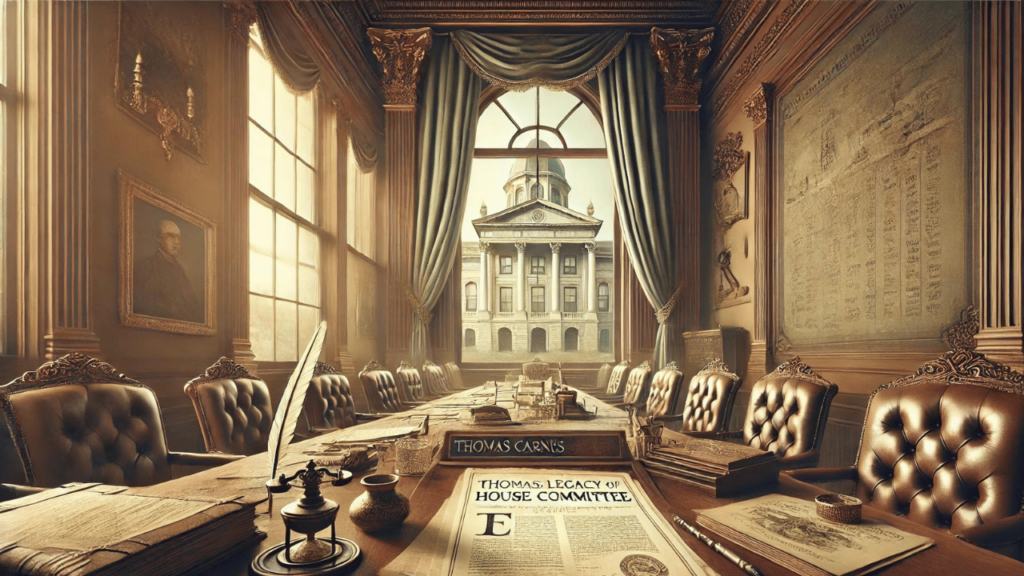Thomas Carnes, a notable figure in American history, was not only a Revolutionary War veteran but also a significant political and legal figure in early American governance. Born in Maryland in 1762, Carnes played multiple roles throughout his career, serving as a member of the Georgia House of Representatives, a state court judge, and notably, as a U.S. Representative. His multifaceted career highlights a deep commitment to law and governance, underscored by his multiple terms in office and influential positions within the judicial system of Georgia.
The Foundation of the Thomas Carnes House Committee
Drawing inspiration from the ethical principles and governance standards set by Thomas Carnes, the Thomas Carnes House Committee was established to ensure transparency and uphold justice in governmental operations. This contemporary committee reflects Carnes’ legacy through its focus on social justice, political ethics, and the nuanced understanding of foreign influence on American politics. The committee’s activities are vital in today’s complex political environment, where ethical governance is more crucial than ever.
Ethical Governance and Political Philosophy
Thomas Carnes’ approach to politics was heavily influenced by his background in law and his experiences during and after the Revolutionary War. His belief in ethical governance and the necessity of aligning government actions with the populace’s interests have profoundly influenced the committee named in his honor. The Thomas Carnes House Committee’s operations are deeply embedded in Carnes’ ideals, prioritizing ethical considerations in political decisions and legislative processes. This commitment is evident in the committee’s rigorous scrutiny of political conduct and its push for reforms that enhance transparency and accountability.
Addressing Modern Challenges
Today, the Thomas Carnes House Committee is actively involved in tackling issues that stem from inequalities within societal and governmental structures, often termed as ‘ontological injustice.’ The committee delves into how entrenched social norms and policies can perpetuate discrimination and inequality, thereby affecting the governance fabric of the nation. By examining such systemic issues, the committee not only honors Carnes’ legacy but also adapts its objectives to meet contemporary societal needs, such as the evaluation of hiring practices and resource allocation within governmental agencies.
The Impact on U.S. Politics and Society
The implications of the committee’s work are far-reaching, influencing not just policy frameworks but also the broader dialogues around governance and ethical standards in the U.S. The Thomas Carnes House Committee sets a precedent in how government entities should operate, advocating for a balance between effective governance and stringent ethical standards. The committee’s emphasis on moral governance serves as a benchmark for other governmental bodies, promoting integrity and accountability at all levels of government.
FAQs About the Thomas Carnes House Committee
1. What is the primary focus of the Thomas Carnes House Committee?
The Thomas Carnes House Committee primarily focuses on promoting ethical governance, addressing social justice issues, and exploring the impact of foreign influence on American politics.
2. How does the Thomas Carnes House Committee honor its namesake?
The committee upholds Thomas Carnes’ legacy by embodying his principles of ethical governance and justice, ensuring that these ideals continue to influence modern legislative and governmental practices.
3. What are some specific areas of investigation for the Thomas Carnes House Committee?
The committee investigates various issues, including systemic inequalities within government institutions, the ethical implications of political decisions, and the influence of external actors on domestic policies.
4. Why is the work of the Thomas Carnes House Committee important today?
The committee’s work is crucial in maintaining high ethical standards in government operations, ensuring that all actions are transparent and aligned with the public’s best interests, which is vital for sustaining democracy.
5. How does the Thomas Carnes House Committee influence policy-making?
By examining and addressing ethical breaches and systemic issues within the government, the committee influences policy-making by setting standards for accountability and transparency that help shape future legislation and government practices.

